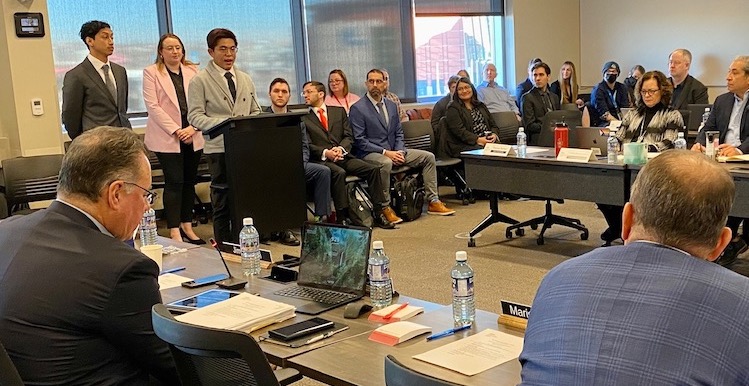

The Dec. 9 Special Finance Committee meeting of Metropolitan State University’s Board of Trustees concluded the calendar year and the chapter of a long-serving Roadrunner rock-and-roller.
New students up and renewed focus on retention
With 40 days until the start of the spring semester, Chief Enrollment Officer Long Huynh, D.B.A., provided an update to the board. Spring undergraduate enrollment is down 3% year over year; however, Huynh noted that at this point last year it was down over 13%. Graduate enrollment (a smaller share of total students) dropped 6.3% this fall.
“We are down, but we are definitely bending the curve,” he said, noting that it tracks with the national trend of an overall 3.4% decline in enrollment at public four-year higher-education institutions.
Bright spots Huynh addressed included application, admission and registration numbers of new students: up 28.7%, 25% and 9.9%, respectively. MSU Denver’s recruitment strategy builds on expanded statewide outreach; strengthened partnerships with high school and community-college pipelines; and messages of affordability, access and excellence (such as the Roadrunner Promise and Tuition Lock programs).
And though year-over-year student head count this fall was down 4.4%, the previous year’s 7.6% drop has been blunted, reflecting the University’s prioritization.
“We need to be focused on retention, retention, retention,” said MSU Denver President Janine Davidson, Ph.D.
State funding still not expected to close budget gap
George Middlemist, outgoing associate vice president of Administration and Finance/CFO, provided a rundown of the state’s budget and its potential impact on the University. Gov. Jared Polis’ budget, announced in November, proposes adding $86 million for higher education. This is projected to translate into approximately $7 million for MSU Denver — an 8.7% increase from fiscal 2023 allocations.
Anticipating a 5% increase in Classified Staff salaries, inflationary and benefit increases, and statewide Family and Medical Leave Act requirements, Middlemist further projected an $8.2 million increase in mandatory expenses and a potential $15 million operational shortfall once increases for faculty and professional staff are factored in.
“The governor’s budget is much more positive than we expected but still not enough to close the gap,” Middlemist said.
The statewide budget also caps tuition increases at 4%, with funds to be distributed in a two-step process.
Middlemist walked the board through three budgetary scenarios contingent on enrollment remaining flat, declining by 2% and declining by 4%. When asked about the University’s ability to weather these scenarios, he drew on Controller Liza Larsen’s board update, which reported a strong stewardship of funds (such as the federal Higher Education Emergency Relief Fund program) along with a struggle to right the tide of historic base underfunding.
“We may have to eat into a bit of our fund balance, but we have strong cash reserves and a lot of things in place to turn the revenue stream of the institution around,” Middlemist said. “We’ll have to watch, measure and make adjustments, but that’s what people here do so well.
“Thanks to our amazing faculty and staff, I think the future is super-bright.”
Capital projects, base underfunding are University priorities entering legislative session
Middlemist also credited the University’s legislative advocacy work to elevate the entire state’s approach to funding higher education.
Kaycee Gerhart provided an update on legislative priorities, emphasizing the need to showcase what MSU Denver is doing to turn the tide of higher-education challenges by focusing on “stuff that works.” The University’s priority is seeking capital funding for two information-technology projects, the Health Institute and the Classroom to Career Hub, along with applying for several state grants tied to workforce initiatives.
Gerhart noted that though the base funding is not projected to meet inflationary pressures, it was “no small potatoes.”
“Step One funding at MSU Denver goes to support first-generation and students of color. Those are directly tied to outcomes the state wants to see,” she added.
Davidson emphasized the need to continue reversing historical underfunding, calling on increased advocacy from the MSU Denver Champions program and underpinnings laid out in this year’s letter to the Joint Budget Committee, penned in conjunction with 14 other post-secondary-education leaders.
MSU Denver will present to this session’s JBC on Jan. 12.
“We’ll be fighting an uphill battle with a constrained, tight state budget,” Gerhart said. “But just because the belt is tightening doesn’t mean we should take our foot off the gas.”
Other items of business:
- Middlemist oversaw and introduced the reporting of student-led internal audits in three areas, covering inherent risks and recommendations:
- Financial Aid: Pujan Shrestha, Mackenzie Cook and Jayden Luong examined Financial Aid systems across areas of provisioning user access, modifying access and terminating access. Recommendations included enhanced prevention measures to remove unauthorized user access after departing, defining roles and responsibilities to prevent inadvertent “mimicking” access, and better communication of the Information Technology Services process timeline throughout departments.
- Transfer Services: Jay Snodgrass and Eloy Chavez looked at transfer services as one of the first points of contact that students have with the University. The audit found that the mean timeline of transcript processing — 9.3 business days — fell within the stated goal of seven to 14 days; recommendations included enhanced coordination of Human Resources and ITS on post-termination employee-access rights and implementation of a planned Family Educational Rights and Privacy Act training program and tracking.
- Tivoli Parking Garage: Robert O’Leary, Marty Jacobson and Christopher Ristuccia worked with the Auraria Higher Education Center to examine the process efficacy of the Tivoli parking garage, a substantial revenue generator for the state-services agency. Results found that losses due to temporary license-plate tags not being picked up by monitoring tools were inconsequential due to low total volume, as was environmental impact on image-capture quality; increasing efficacious software translation of image quality was identified as a high-potential area with a reperformance of the manual “TivHits” process recommended.
- Jean Bushong, principal with CliftonLarsonAllen, provided a preview of the financial and compliance audit results, which are expected to be finalized this week. Highlights include an unmodified (or “clean”) opinion, with no audit adjustments to date and one internal-control deficiency on an access-right issue (identified in the student audit). HEERF fund finding are also anticipated to cover disbursement, reporting, fund management and lost revenue.
- The powerhouse MSU Denver Women’s Volleyball team was recognized, with Athletics Director Todd Thurman crediting team members as “great representatives of MSU Denver, both on and off the courts.”
- Trustee Mario Carrera is departing to focus on his role as president/CEO of the Colorado Latino Leadership Advocacy & Research Organization. The board recognized him with a plaque and acknowledged his work as co-chair of the Sustained Racial Justice Committee, reaffirming its 2020 anti-racist resolution.
- Middlemist was also acknowledged as a Staff Emeritus member for his more than 25 years of service to MSU Denver as he wrapped the Dec. 9 meeting in true George fashion: sporting a blazer over an AC/DC T-shirt. “Thank you for the honor to serve as long as I have,” Middlemist said. “This is my family, this is my home, and Metro will always be my home. I’ll forever be a Roadrunner Emeritus – which is an amazing thing to be able to say as a guy in a rock-and-roll t-shirt.”


